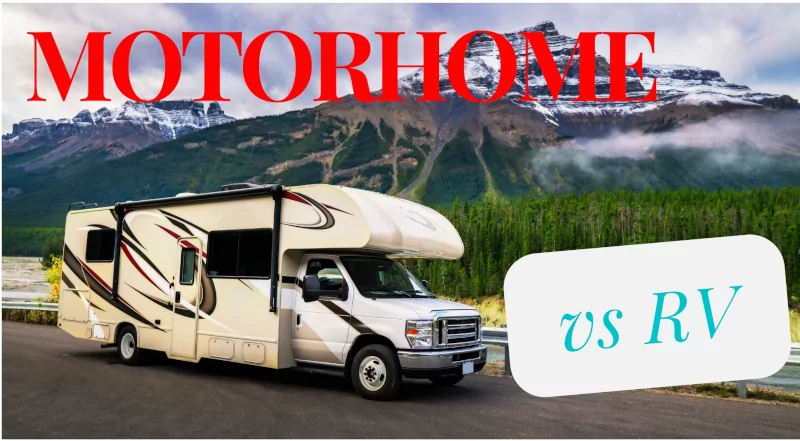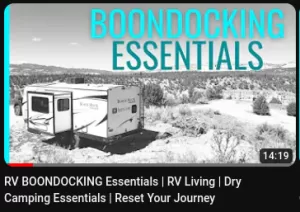Last Updated on 07/25/2024 by Glynn Willard
Difference Between Motorhome and RV?
A motorhome is an RV, but an RV isn’t necessarily a motorhome.
Since I was in the state of Delaware while writing this article, I looked into DE’s code for vehicle registration.
In the state of Delaware’s exact words:
I looked at a few other state’s title codes and found the same thing.
I have to add that the only time it “gets weird” is when one tries to register camper vans as motorhomes.
We have a Roadtrek Zion and DE Motor Vehicle tried to register the van as a commercial Promaster utility van.
Insider tip. If you ever plan on buying a campervan, be well prepared with all the paperwork to prove it’s a professionally built campervan.
Aside from that, there are some important points to consider based on personal preference about the key differences in RVs further in the article.
I know, I know, going to RV dealerships is fun!
But before you go, do some homework and narrow down the most suitable type of RV for you.
Let’s explore!
What Does RV Stand For?
The definition of a recreational vehicle is regulated at the state level for registration purposes and may differ slightly between states.
I mentioned Delaware’s definition, so here’s another example straight from Pennsylvania’s general assembly:
“A vehicle which is either self-propelled or towed by a consumer-owned tow vehicle and designed to provide temporary living quarters for recreational, camping or travel use that complies with all applicable Federal vehicle regulations and is certified by the manufacturer as complying with NFPA 1192 Standard on Recreational Vehicles or ANSI A119.5 Park Model Recreational Vehicle Standard and includes the following types:
- Motor home. AKA drivable RVs.
- Travel trailer.
- Fifth wheel travel trailer.
- Folding camping trailer. AKA a pop-up camper.
- Truck camper. AKA a removable camper installed on or in a truck bed.
- Park model RV.”
Without diving into ever every state, RV stands for pretty much the same thing in every state.
I encourage you to familiarize yourself with your state’s RV definitions before deciding on the RV type for your first RV.
Regardless, those of you who live the RV lifestyle understand that it’s more than just a “recreational vehicle.”
It also means:
- Community
- Exploration
- Family time
- Memories
I can personally attribute that those and many more make up the pleasures of RVing regardless of the RV class or one’s definition of RV.
Different Types Of RVs
Here’s a list and a very brief description of what most states consider to be recreational vehicles.
- Travel Trailers
- Fifth Wheels
- Toy Haulers
- Truck Campers
- Pop-Up Campers
- Teardrop Trailer
- Class A RVs
- Class B RVs
- Class B Plus
- Class C RVs
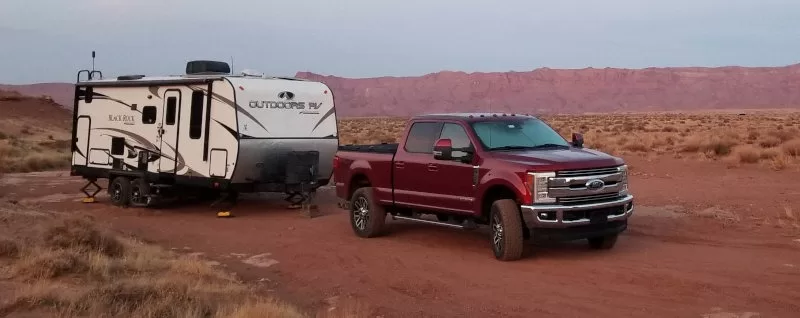
Travel trailers are towable RVs that are mounted to a tow vehicle’s bumper.
We spent two years living in a travel trailer full-time and loved it!
When you picture a classic camper, chances are it’s a travel trailer.
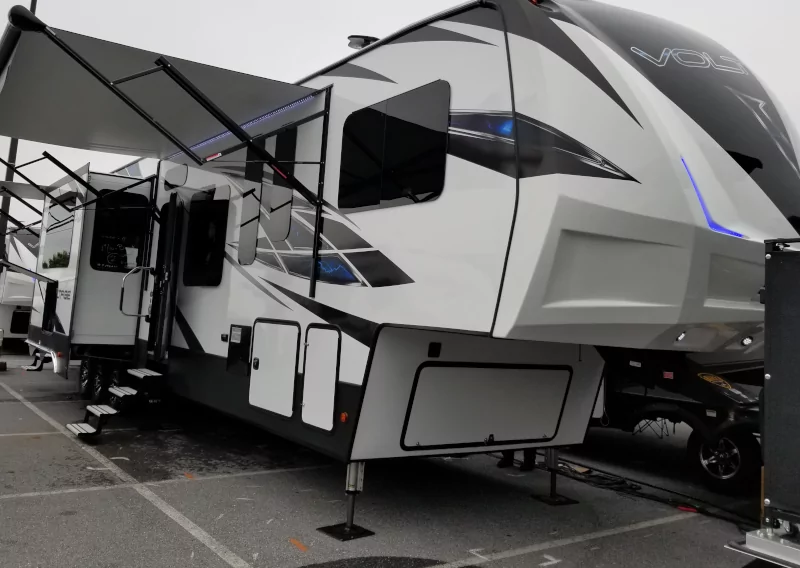
Fifth wheels are towable units that mount above the rear axle of the tow vehicle.
Generally, that’s in the bed of a pickup truck, but it can also be a flatbed truck.
Fifth wheels are very livable and incorporate a lot of storage space.
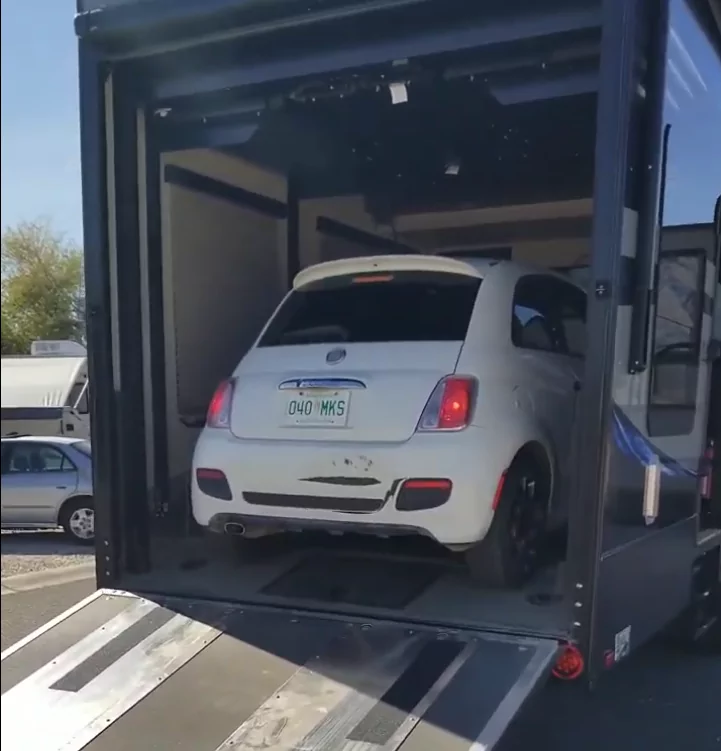
Toy haulers have a high cargo-carrying capacity because they’re equipped with a garage to carry OHV’s, motorcycles and even small cars.
Toy haulers can be bumper-pull trailers, fifth-wheel trailers, class A motorhomes or class C motorhomes.
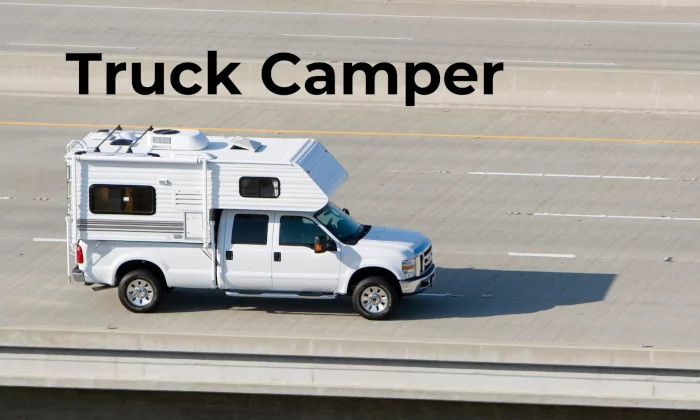
A “camper living space” is mounted in the bed of a pickup truck or on the flatbed of a truck.
Many can be removed and remain in your camping spot while you use the truck to explore or use the bed of the truck to return to camp with supplies.
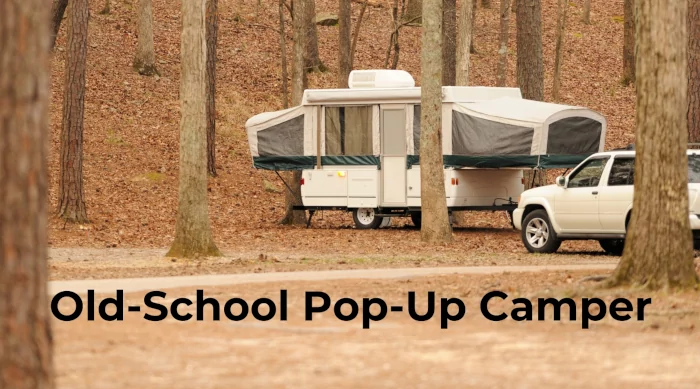
Pop-up campers are small towable trailers that transform from a low-profile trailer to a semi-full camper.
There are some newer models on the market that are a slightly larger size and open up or expand with hard sides.
If you only camp occasionally, take short trips and you don’t have a heavy duty tow vehicle, pop-up campers are a great bang for the buck.
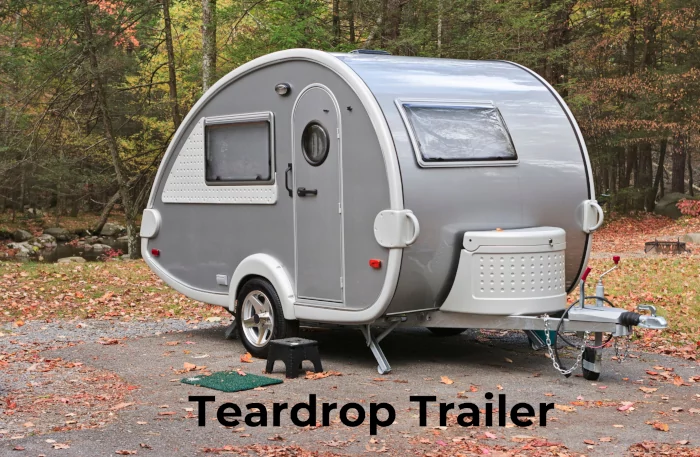
Teardrop trailers are lightweight and easily towed by most vehicles.
They typically don’t offer much or any living space, only sleeping quarters.
In other words, teardrop trailers are hard sided, towable tents.
Many are equipped with an outdoor kitchen in the rear and a freshwater tank.
Other than that, there’s almost no extra space for storage.
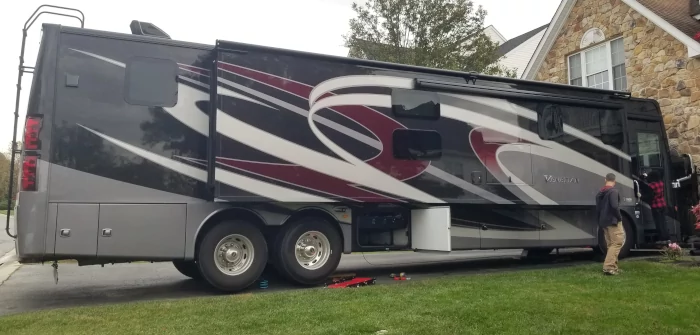
A class A motorhome, is what most people think of when they mentally picture a “motorhome.”
It has a large windshield and the main difference is a flat front vs a “truck-like” front cab.
The engine is either in the front or back (diesel pusher).
Class A’s can be powered by either diesel engines or gasoline.
In my opinion, gas motorhomes are underpowered and suffer poor fuel economy.
Class A motorhomes offer a lot of livable space and storage for an RV with an engine.
In fact, a class A motorhome offers the most living area of all the motorized RV’s.
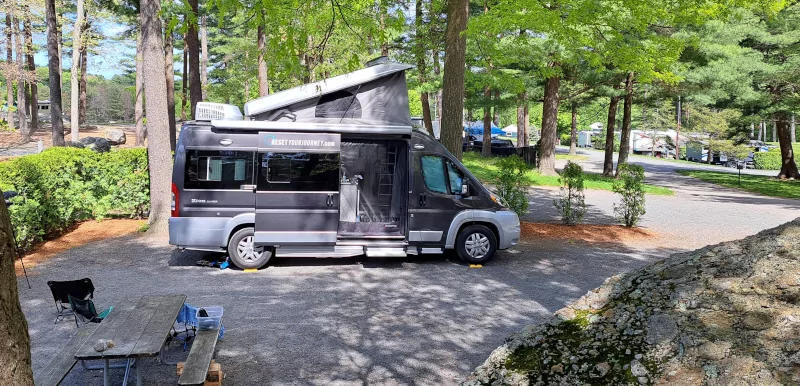
Class B motorhomes are also referred to as campervans.
They’re super agile and fantastic for road trips for one or two people.
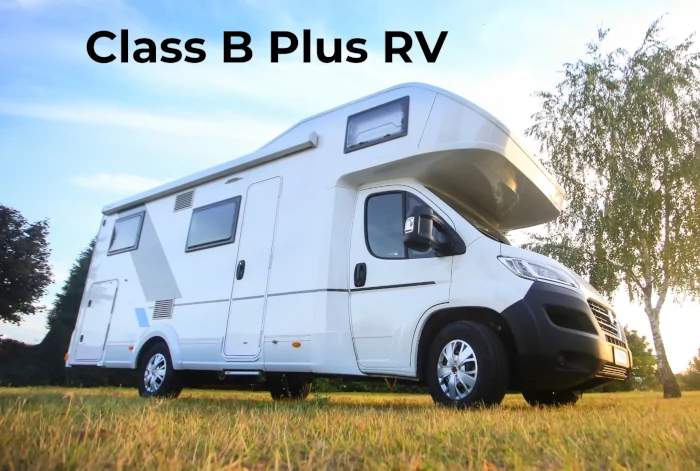
If it’s a class B plus, it’s a campervan on a long chassis offering more interior space than a short campervan.
The aft section is a little wider than a typical van.
In my opinion, they look like a class C and a Campervan bred and produced offspring.
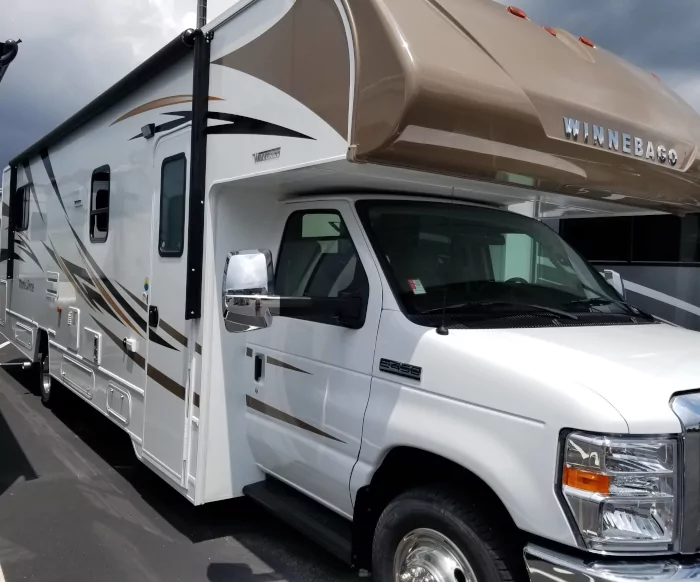
Class C motorhomes come in several different flavors. Most have a super duty truck cab front and “motorhome” back side.
There are larger models called super C’s which have the front cab of a semi truck.
They’re beasts with a really high cargo carrying and towing capacity. They also come with a hefty price tag.
Which RV Is The Best Option For You?
In order to make an informed decision about which RV is best for you, there are some key points to consider.
- How many people will be using your RV with you?
Obviously, if there are a lot of you, an RV that’s a smaller size will not work. - What’s your travel style and where do you plan on taking your RV?
If you plan on staying exclusively in RV parks, any type of RV will be suitable.
But if you plan to boondock on public lands in remote areas, something like a large motorhome will limit your options.
A heavy duty off road truck and travel trailer with high ground clearance and good suspension is best suited for remote dispersed camping. - Do you want a camper that has an engine or are you okay with towable campers?
The beauty of a towable RV is that you can set it up and use the tow vehicle as your “get-around town” vehicle.
It also means you don’t have to tow a vehicle with an engine such as a small car behind the motorhome or campervan (toad). - Do you care about fuel efficiency?
Towing large trailers and fifth-wheel campers burns a lot of fuel.
The same is true for class A and C motorhomes.
But, class B campervans can do pretty well for an RV. Our Roadtrek is built on a 2022 Dodge Promaster chassis and averages 17 mpg of gasoline.
That may not sound good, but motorhomes and towing a trailer tends to be anywhere between 4-11 mpg of gasoline or diesel fuel. - Do you want all the comforts of home with you?
You’ll need more space and a higher cargo-carrying capacity to manage all the systems you’ll need, such as a generator, large battery bank, solar panels, and large freshwater and wastewater tanks.
If it’s a larger RV, you’ll need more than one air conditioning unit on the roof. That requires a lot of power.
Again, if you’re staying in an RV park, this point is moot.
You’ll also need a full kitchen and full bathroom to maintain the “creature comforts of home.” - Are you okay with a small bathroom in a campervan?
This is a popular choice for solo travelers, but certain amenities are limited.
Most campervans have full kitchens, but they’re tiny and if there even is a bathroom, it too is small. - Do you plan on living in your RV?
Because this will be your mobile home, you’ll want all of the sleeping areas to offer comfort and privacy.
Even if you’re a minimalist, the RV (and tow vehicle) needs to have the capacity to carry all of your essentials including tools. - Do you have the finances to manage the maintenance costs of larger RVs?
Large motorhomes have the highest maintenance costs and towable trailers have the lowest maintenance costs.Of course, size of the RV plays a role in the maintenance cost.
- A comfortable sleeping area with a bed.
- Freshwater supply.
- A facility to store and cook food.
- Most have wastewater tanks.
- Not all, but the majority have some type of bathroom.
- Most newer campers have a battery bank, charge controller and solar panels.
- The majority of campers have a way to heat the interior and many have air conditioning systems.
- Some RVs even have entertainment systems for those of you who spend more time in your RV.
Basic Amenities Of RVs
Most RV’s are equipped with the basic equipment to camp or travel the open road and sustain life for several nights.
These include:
Your answers to the questions in the previous section will dictate the type of amenities that are the most important to you.
Different types of campers tend to have different amenities, so spend some time learning about various terms and different types.
You’ll also find different amenities for smaller RVs versus large RVs.
Not Sure What You Need For Your RV?
Wrapping Up Difference Between Motorhome And RV
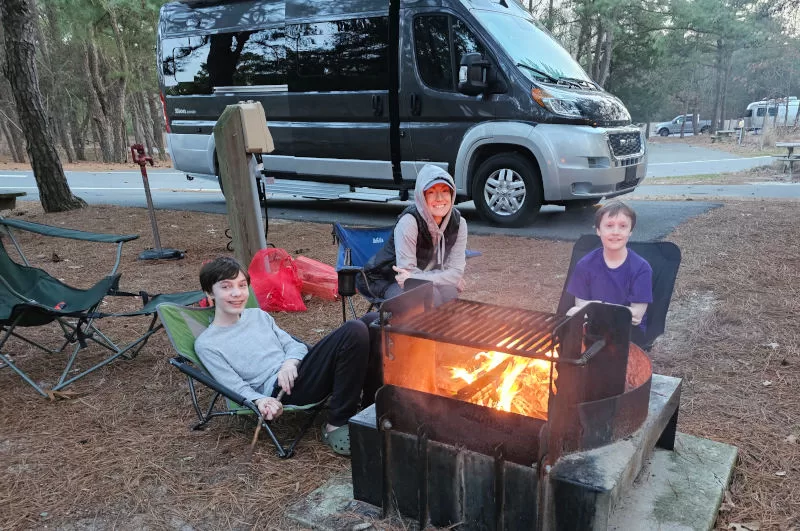
Again, according to most states,
In our experience with different types of RVs, we prefer the simplicity of a bumper-pull travel trailer.
It’s agile once you learn to maneuver a trailer, cost effective and offers all the creature comforts of home.
I hope this article helped to clarify what an RV is and the different types without too much RV jargon.
Have you figured out which type of RV is best for you?
Meet the author.
We appreciate any help in bringing you great content. Donate or buy us a coffee on our Ko-Fi site. Or subscribe to our YouTube Channel.
Thank you so much for being here!


